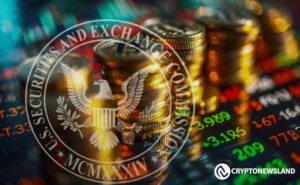Lawmakers Challenge SEC: Are Crypto Airdrops Securities under Howey Test, Asks Emmer and McHenry
- Lawmakers questioned Gary Gensler on whether free digital asset airdrops fall under the Howey Test according to the current securities legislation.
- The comparison was made between airdrops and rewards like airline miles, urging the SEC to clarify the differences between these and blockchain-based incentives.
- Concerns were raised regarding the economic repercussions of categorizing tokens as securities, which could include potential losses in growth and tax revenue.
US Lawmakers Challenge SEC on Crypto Airdrop Regulations, Highlighting Potential Economic Risks
Critical Review of SEC’s Stance on Crypto Airdrops
US House Majority Whip Tom Emmer and Financial Services Committee Chairman Patrick McHenry have raised significant concerns about the SEC’s classification of crypto airdrops as securities. In a letter addressed to SEC Chair Gary Gensler, they questioned the agency’s regulatory approach towards airdrops.
Implications for Blockchain Ecosystem
The letter emphasized the crucial role that airdrops play in the blockchain ecosystem, describing them as essential for incentivizing early participation. According to the lawmakers, these airdrops foster decentralization and governance, which are foundational elements of blockchain networks. Their critique suggests SEC’s current regulatory environment under Gensler could be stifling blockchain innovation by creating undue obstacles.
Clarifying the Howey Test’s Relevance
One of the critical questions posed in the letter pertains to whether giving away digital assets for free should trigger the Howey Test—a legal standard used to determine if a transaction qualifies as an investment contract. Given that these assets are not classified as securities, the lawmakers queried the SEC’s basis for considering airdrops under this framework.
Comparisons with Traditional Rewards
The lawmakers compared crypto airdrops to traditional consumer rewards like airline miles and credit card points, which are not evaluated under the Howey Test. They questioned how the SEC differentiates these rewards from crypto airdrops, seeking clarity on the regulatory distinctions made by the SEC between these various forms of incentives.
Potential Economic Impact of Classifying Tokens as Securities
The letter further highlighted potential economic ramifications if digital tokens are categorized as securities. Emmer and McHenry cautioned that such a classification could stymie the functioning of on-chain applications and deter developers. They pointed out that the value of these tokens is primarily driven by their use within the network, likening them more to commodities than to traditional securities.
Data Requests and Economic Considerations
The lawmakers have requested that the SEC provide quantifiable data on the economic impact of its regulatory actions, particularly regarding growth and tax revenue. They stressed that existing SEC regulations are already discouraging developers from allowing American users to participate in airdrops, further highlighting the need for a more conducive regulatory framework.
Conclusion
In conclusion, Emmer and McHenry’s letter underscores the need for a clearer and more supportive regulatory environment to foster the growth of blockchain technology in the US. As they await a response from Gary Gensler, the ongoing debate continues to shape the future landscape of cryptocurrency regulation.
Disclaimer: The content of this article solely reflects the author's opinion and does not represent the platform in any capacity. This article is not intended to serve as a reference for making investment decisions.
You may also like
Is Sam Bankman Tweeting from Jail? Internet Asks
Crypto Price Today (Feb 25, 2025): Bitcoin Dips Below $90k; ETH, XRP & SOL Drops 13%
Why is Chainlink ($LINK) price down today? Can it recover from here?
SEC Acknowledges Grayscale’s Cardano ETF as Review Process Starts

